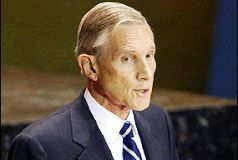EU leaders hold talks in Sudan after new sanctions threat
KHARTOUM, Oct 13 (AFP) — A European Union delegation led by Dutch Foreign Minister Bernard Bot was holding talks after renewed EU sanctions threat against Khartoum over the Darfur crisis.
 The talks were expected to cover both the situation in Darfur — described by the United Nations as the setting of the world’s worst humanitarian crisis — and progress in the peace process in southern Sudan aimed at ending Africa’s longest-running civil war.
The talks were expected to cover both the situation in Darfur — described by the United Nations as the setting of the world’s worst humanitarian crisis — and progress in the peace process in southern Sudan aimed at ending Africa’s longest-running civil war.
Bot, whose country holds the rotating EU presidency, and other members of the delegation, were holding talks with his Sudanese Foreign Minister Mustafa Ismail and were due to meet later with President Omar al-Beshir.
The EU this week issued a renewed sanctions threat against Khartoum over the Darfur crisis, which has left some 50,000 people dead, displaced an estimated 1.4 million and forced a further 200,000 into neighbouring Chad.
On Tuesday, the Sudanese foreign ministry summoned the European Union’s delegation chief in Khartoum in protest.
“The Sudanese government should continue to feel the pressure from as many sides as possible,” Bot told reporters this week. It is very important that the threat of sanctions be maintained.”
Ismail said Tuesday Khartoum would welcome any international fact-finding effort on Darfur “but at the same time, we reject a visit by any official with the aim of threatening and pressuring the Sudan.”
Ismail also said the government was making arrangements to implement demands over Darfur that British Prime Minister Tony Blair made in Khartoum last week.
He said he met Monday with Interior Minister Abdel Rahim Mohamed Hussein, who is also the president’s representative in Darfur.
“The meeting discussed the manner in which all aspects of the agreement (with Blair) will be implemented,” Ismail said.
The British premier held talks with Beshir on October 6 and obtained five promises from Khartoum.
He demanded that the African Union troop contingent be boosted, that the government provide the locations of its troops in Darfur, pull them back in conjunction with a rebel withdrawal, commit to an overall peace agreement for Sudan by the end of 2004 and abide by signed UN humanitarian protocols.
The AU currently has about 300 soldiers in Darfur to protect some 150 observers monitoring a fragile ceasefire struck in April between Khartoum and Darfur rebel groups.
The Security Council passed a resolution in September threatening sanctions against Sudan’s vital oil industry, saying the government had failed to rein in the Janjaweed militias.
Earlier this month the EU said it would wait for a green light from the United Nations before deciding whether to impose sanctions.
On south Sudan, Khartoum and the Sudanese People’s Liberation Army (SPLA), led by John Garang, are in the final stage of a peace process, whose aim is to put an end to a civil war that started in 1983 and has killed nearly one and a half million people.
